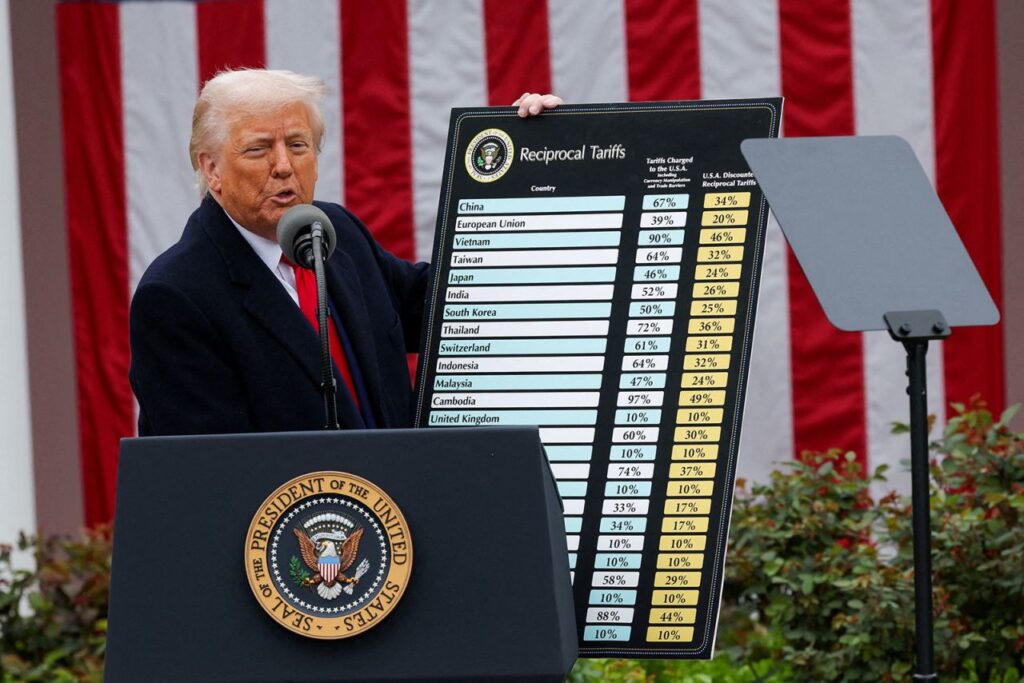Crude oil prices took a sharp hit earlier this year, dropping by 3% as global markets reacted to the sweeping tariffs imposed by former U.S. President Donald Trump on major trade partners.
With tariffs ranging between 10% and 34%, concerns are mounting over the potential impact on global trade and energy demand.
At the time of writing, Brent crude was trading at $70.60 per barrel, while West Texas Intermediate (WTI) stood at $67.26 per barrel.
Despite the recent dip, prices remained relatively stable compared to the past month, signaling cautious optimism among traders. However, analysts warn that further declines could be on the horizon as the full impact of tariffs unfolds.
The introduction of these aggressive tariffs has sparked fears of economic slowdown, with analysts highlighting the risks to global trade and energy markets.
Nomura Securities analyst in an interview said, “Trump’s tariffs carry the risk of destroying the global free trade order the United States itself has spearheaded since the Second World War.”
Trade restrictions of this scale inevitably create ripple effects across industries, including the energy sector.

Market analysts argue that the demand for crude oil and petroleum products could decline if trade tensions escalate further.
According to Yeap Jun Rong, an IG analyst, the oil market’s focus has now shifted to global economic growth projections.
“For oil prices, the focus now shifts to the global growth outlook, which is likely to be revised downward due to these higher-than-expected tariffs.”
Yeap Jun Rong, an IG analyst
Initially, traders had anticipated more moderate tariffs in the 10%-20% range, but the 34% tariff on some imports exceeded expectations, raising further concerns.
Market Reaction: Worst-Case Scenario

With the new trade barriers in place, financial experts worry that these measures will lead to an economic downturn, directly affecting global oil demand.
In a research note, ING commodity analysts noted that markets are now watching closely for any signs of retaliation from U.S. trading partners.
“The scale of some of Trump’s tariffs will raise global demand concerns.
“There’s also increased uncertainty, with markets waiting to see how trading partners retaliate.”
ING commodity analysts
Ajay Rajadhyaksha, global chair of research at Barclays, echoed similar concerns. “This is close to the worst case that the market feared. This will cause damage,” he told the Financial Times.
Meanwhile, Pavel Molchanov, an analyst at Raymond James, emphasized that tariffs typically have broad economic repercussions.
“Tariffs have a negative effect on the overall economy, and anything that has a negative effect on the overall economy is going to — all other things being equal — damage oil demand.”
Pavel Molchanov, an analyst at Raymond James
Adding to the complexity, U.S. trade partners, including China and the European Union, have already begun formulating countermeasures.
China, in particular, wasted no time in responding, imposing its own tariffs on American imports—including energy products.

China, the world’s second-largest oil consumer, had been increasing its imports of U.S. crude oil following Washington’s push to expand energy exports. However, with the latest trade war developments, Beijing is likely to shift its energy procurement strategies.
Given its vast energy needs, China has alternative suppliers such as Russia, Saudi Arabia, and Iran, making it easier to redirect its purchases away from the U.S.
On the other hand, the European Union (EU) may face greater challenges in replacing U.S. energy supplies.
The EU is more reliant on a stable and predictable supply chain, and any disruption could cause long-term shifts in trade dynamics.
The uncertainty surrounding global trade policies has left oil traders and investors in a precarious position. If trade tensions persist or escalate, crude oil prices could experience further volatility.
The crude oil market now stands at a crossroads. The uncertainty surrounding U.S. tariffs, global trade tensions, and economic growth projections has created a fragile balance that could tip in either direction.
If trade partners retaliate aggressively, oil prices may see further declines due to weakened demand. However, if negotiations lead to tariff reductions or adjustments, the market could stabilize.
For now, all eyes remain on how the world’s largest economies navigate the evolving trade landscape—a factor that will undoubtedly shape global energy markets in the months ahead.
READ ALSO: Israel To Establish New Security Corridor Across Gaza Strip























